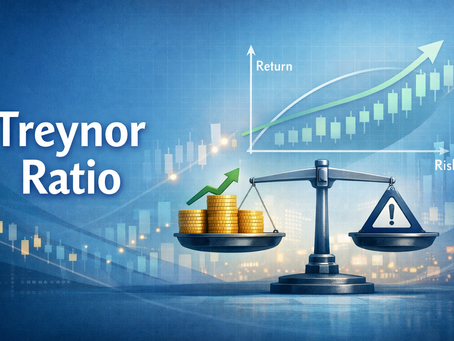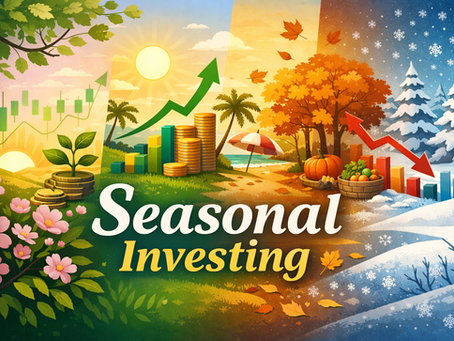top of page

Blog


Financial Word of the Day: Alpha
Alpha is one of those financial words that gets tossed around a lot — especially by fund managers, financial media, and anyone trying to sound smart on CNBC. But once you strip away the jargon, it’s actually a very practical concept that helps you understand whether an investment is truly earning its keep.
What Is Alpha?
In simple terms, alpha measures how much better (or worse) an investment performs compared to its benchmark.

Larry Jones
Jan 192 min read


The History of Money Meets the Future of AI: How We Got Here
Let’s take a step back from the tech hype for a second. Before we talk about Artificial Intelligence and side hustles and dashboards that run themselves…Let’s talk about money.
Because here’s what I believe: To truly own your future, you’ve got to understand the story of how we got here.
Money didn’t always look like Venmo, Bitcoin, or Apple Pay. And the idea of AI helping you build wealth from your laptop? That would’ve sounded like science fiction just a generation ago.

Larry Jones
Jan 163 min read


Financial Word of the Day: Treynor Ratio
What Is the Treynor Ratio?
The Treynor Ratio measures how much return an investment generates per unit of market risk.
More specifically, it evaluates returns relative to systematic risk, which is the risk you cannot diversify away—the risk of the overall market. This is measured using beta.
Here’s the simple idea: How much reward did I get for the market risk I took?
The formula looks like this:
Treynor Ratio = (Portfolio Return – Risk-Free Rate) ÷ Beta

Larry Jones
Jan 162 min read


Financial Word of the Day: Sortino Ratio
What Is the Sortino Ratio?
The Sortino Ratio is a performance metric that measures an investment’s return relative to its downside risk.
In plain English: It tells you how much return you’re getting for the bad volatility, not all volatility.
That’s an important distinction.
Most traditional risk metrics treat all ups and downs as risk. But let’s be honest—most investors don’t lose sleep over their portfolio going up. They worry about losses.

Larry Jones
Jan 152 min read


5 Reasons Artificial Intelligence Is Reshaping How You Build Wealth
There’s a shift happening right now — and if you're paying attention, you can feel it.
The rules of the money game? Being rewritten.
The people winning big? They’re not always working harder. They’re working smarter. They’re using AI.
And whether you’re a creative, a coach, a solopreneur, or still figuring out your path — this is a wake-up call. Artificial Intelligence isn’t just for tech geeks or Silicon Valley.
It’s for you.
Let me show you five reasons AI is flipping

Larry Jones
Jan 143 min read


Financial Word of the Day: Sharpe Ratio
What Is the Sharpe Ratio?
The Sharpe Ratio measures how much return an investment generates relative to the risk taken to earn it.
In plain English: It tells you whether your investment’s performance is due to skill or just roller-coaster volatility.
The basic idea is this: Higher Sharpe Ratio = better risk-adjusted return
Two investments might earn the same return, but the one with a higher Sharpe Ratio did it with less turbulence along the way.

Larry Jones
Jan 142 min read


Financial Word of the Day: Risk Budgeting
What Is Risk Budgeting?
Risk Budgeting is the process of intentionally deciding how much investment risk you’re willing—and able—to take, and then allocating that risk across your portfolio in a disciplined way.
In plain English: It’s not just what you invest in—it’s how much volatility, uncertainty, and downside exposure you allow each investment to have.
Instead of saying, “I’ll put 60% in stocks and 40% in bonds and hope for the best,” risk budgeting asks a smarter ques

Larry Jones
Jan 132 min read


What Is AI Money? Understanding the New Era of Wealth Creation
So, What Is AI Money?
AI Money isn’t just about robots taking jobs or ChatGPT writing your emails.
It’s about leveraging this massive technological shift to create new income, multiply your time, and expand your financial potential—without selling your soul or burning out in the process.
It’s not a “get rich quick” scheme.It’s a mindset shift. It’s a toolkit. It’s a movement.
And in my book, AI Money: How to Use Artificial Intelligence to Supercharge Your Personal Finance

Larry Jones
Jan 122 min read


Financial Word of the Day: Risk Parity
Definition of Risk Parity
Risk Parity is an investment strategy that builds a portfolio by balancing risk, not just dollars. Instead of allocating money based on how much you invest in each asset, risk parity focuses on how much volatility each asset contributes to the overall portfolio.
In plain English: it’s not about how much money you put in—it’s about how much stress each investment puts on your portfolio.

Larry Jones
Jan 122 min read


Financial Word of the Day: Core-Satellite Portfolio
If you’ve ever felt torn between “playing it safe” and “trying to grow faster,” the Core-Satellite Portfolio might be exactly what you’re looking for. It’s a smart, flexible investing framework that blends stability with opportunity—without turning your portfolio into a full-time hobby.
What Is a Core-Satellite Portfolio?
A Core-Satellite Portfolio is an investment strategy that divides your portfolio into two main parts...

Larry Jones
Jan 92 min read


Financial Word of the Day: Strategic Asset Allocation
If you’ve ever felt like investing advice changes with every headline, Strategic Asset Allocation is the calming counterweight.
Strategic Asset Allocation is the long-term framework for how your money is divided among major asset classes—typically stocks, bonds, cash, and sometimes real estate or alternatives—based on your goals, time horizon, and risk tolerance. It’s the “set the course and stick to it” approach to investing.

Larry Jones
Jan 82 min read


Financial Word of the Day: Tactical Asset Allocation
Tactical Asset Allocation is a fancy-sounding term for something pretty practical: temporarily adjusting how your money is invested based on current market conditions.
Think of it as steering the ship—not rebuilding it.
The Simple Definition of Tactical Asset Allocation
Tactical Asset Allocation (TAA) is an investment strategy where you make short-term adjustments to your portfolio’s asset mix (stocks, bonds, cash, real estate, etc.) to take advantage of market opportuniti

Larry Jones
Jan 72 min read


Financial Word of the Day: Momentum Strategy
Momentum Strategy is a simple but powerful investing concept built on one core idea:assets that have been performing well tend to keep performing well—at least for a period of time.
Instead of trying to predict what might do well next, a momentum strategy focuses on what’s already working and rides that trend until the momentum fades.
This approach isn’t flashy. It’s disciplined. And when used wisely, it can help investors avoid emotional decision-making and align their mon

Larry Jones
Jan 62 min read


Financial Word of the Day: Contrarian Strategy
Definition of Contrarian Strategy
A Contrarian Strategy is an approach to investing (and decision-making) where you intentionally go against the prevailing market sentiment. When most people are optimistic and buying aggressively, contrarians get cautious. When most people are fearful and selling, contrarians start looking for opportunities.
At its core, a contrarian strategy assumes that markets often overreact—both on the upside and the downside...

Larry Jones
Jan 52 min read


Financial Word of the Day: Seasonal Investing
A Simple Definition of Seasonal Investing
Seasonal Investing refers to investing strategies that take advantage of recurring calendar-based trends in the financial markets.
These trends can be monthly, quarterly, or tied to specific parts of the year — like holidays, earnings seasons, or even weather patterns.
A classic example is the saying, “Sell in May and go away,” which reflects the historical tendency for stocks to underperform during the summer months...

Larry Jones
Jan 22 min read


Financial Word of the Day: Sector Rotation
Definition of Sector Rotation
Sector Rotation is an investment strategy that involves shifting money between different sectors of the economy—such as technology, healthcare, energy, or consumer goods—based on where we are in the economic or market cycle. The idea is simple: different sectors tend to perform better at different times.
In other words, not all parts of the market lead at the same time. Smart investors pay attention to where the momentum is moving next...

Larry Jones
Jan 12 min read


Financial Word of the Day: Relative Strength
Definition of Relative Strength
Relative Strength is a way to compare the performance of one investment to another—most commonly against the overall market or a benchmark like the S&P 500. Instead of asking, “Is this investment going up?” relative strength asks the better question: “Is this investment performing better or worse than something else?”
That subtle shift matters more than most people realize.
An investment can be rising in price and still be a poor performer..

Larry Jones
Dec 31, 20252 min read


Financial Word of the Day: Momentum
Definition of Momentum
In finance and investing, momentum refers to the tendency of an asset’s price, earnings, or financial performance to continue moving in the same direction for a period of time. Simply put: what’s been working lately often keeps working—at least for a while.
Momentum is rooted in human behavior. Investors don’t change their minds overnight. Confidence builds gradually...

Larry Jones
Dec 30, 20252 min read


Financial Word of the Day: Mean Reversion
The Definition of Mean Reversion
Mean Reversion is the concept that over time, prices, returns, or performance tend to move back toward their long-term average—or “mean.”
In plain English: What goes up too far usually comes back down.What goes down too far often comes back up.
Markets don’t move in straight lines forever. They swing. They overshoot. Then they correct.

Larry Jones
Dec 29, 20252 min read


Financial Word of the Day: Window Dressing
What Is Window Dressing?
Window dressing is the practice of making financial statements, investment portfolios, or business results look better than they really are—usually right before they’re reviewed by outsiders.
It’s not always illegal. But it’s often misleading.

Larry Jones
Dec 26, 20252 min read
bottom of page